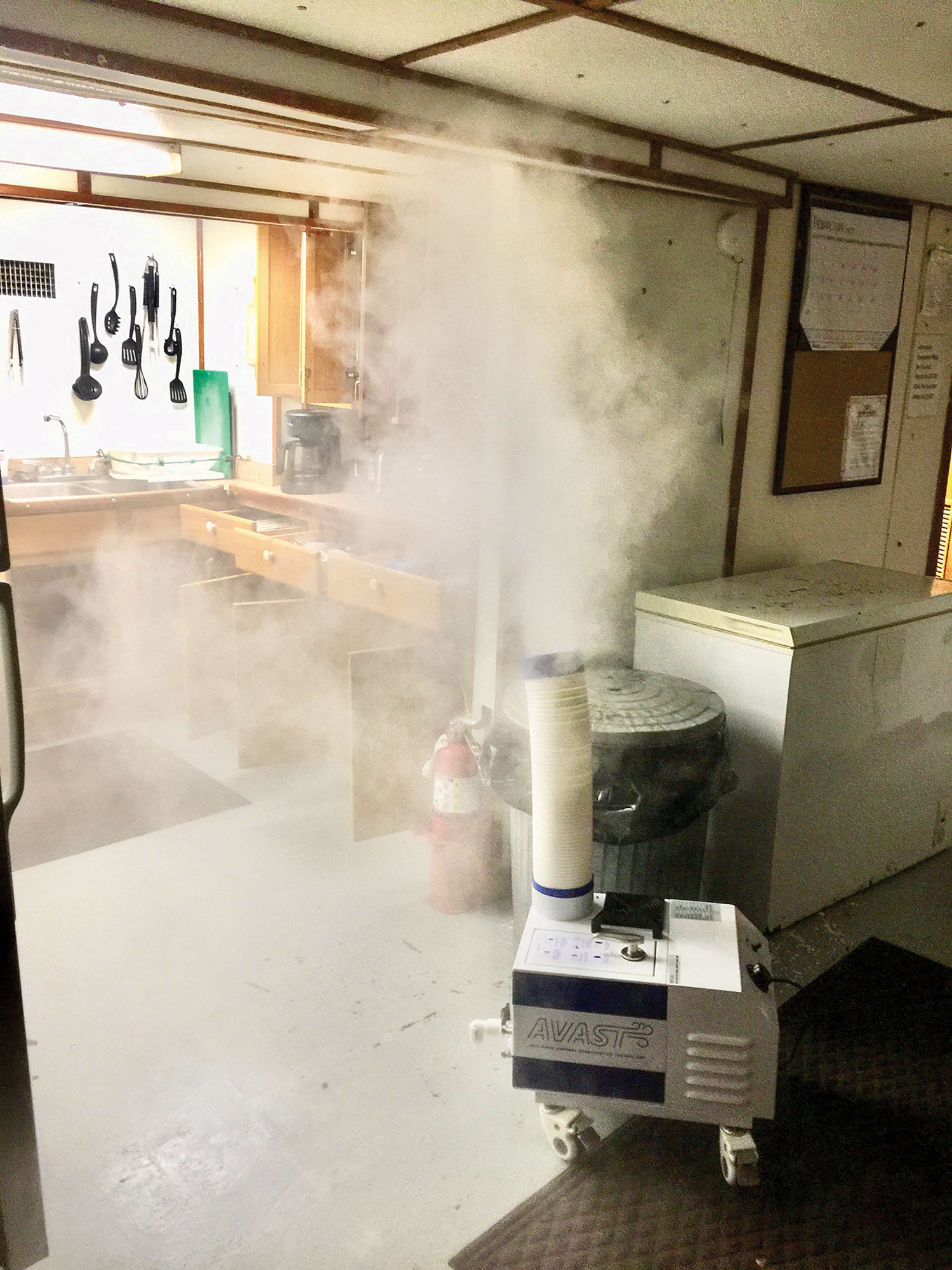Non-toxic, food-safe sterilization technology first developed for the cruise industry is now available to help prevent the spread of many types of illnesses on workboats and elsewhere.
AVAST Anti-viral Aerosolized Sterilization Technology™ uses aerosolized hydrogen peroxide and ozone to create a dry mist that leaves no residue behind. The product was developed and is marketed by Wela Group LLC, a Long Island, N.Y.-based innovation and development company operating primarily in the marine field. It is available for purchase at welagroup.com.
“In September of 2019 we were exploring different technologies to destroy norovirus on ships, particularly cruise ships,” Wela Group CEO Barbara Dutton-Weingarten said. “We looked into aerosolized H2O2 and UVC light, as well as other technologies. Our main criteria were that it was to be something that was non-toxic, food safe and leaving no residue. It was important that it be portable, simple to operate with no need for additional staff. We identified a technology out of Italy and were working out the final details of our distributor agreement, and then the coronavirus hit Italy. The Italian government commandeered their entire inventory in the name of the national good. That left us with no product, but we still needed to solve the problem.
“Fortunately, we have a team that has a ‘Failure is not an option’ approach,” she continued. “As we all know, mariners and engineers do not stop until a problem is resolved!”
The solution was a three-pronged approach to sterilization, said Eric Holohan, chief technology officer.
“AVAST uses well established, EPA [Environmental Protection Agency] registered antimicrobials: off-the-shelf 3 percent to 10 percent hydrogen peroxide and ozone, which the unit produces itself,” Holohan said. “It has an ultrasonic dry mist generator to micronize the antimicrobials while the incoming air to the device is also treated via an immobilized silver filter, which is also bioactive. It is food safe and leaves no residue. Third-party lab tests have demonstrated a greater than 99.98 percent destruction of the coronavirus, leaving no viable virus on treated areas.”
Additionally, he said, AVAST is small, portable, easy to use, cost-effective and “a very quick way to decontaminate air and surfaces while leaving zero chemical residue.”
All that is left behind is water vapor and breathable oxygen.
“The surfaces will feel dry to the touch even directly after a complete application at room temperature,” he said.
Dutton-Weingarten and Holohan developed the technology with wide application to killing germs that cause many different types of illnesses.
“Although COVID-19 is currently the most pressing problem, AVAST was designed with an eye to the future, and not just for solving what is happening today,” Dutton-Weingarten said. “Our system is effective against many base types of pathogens, including 32 different virus bases,108 different bacterial types, including E.coli, and 38 molds and spores, including black mold and anthrax.”
Ron Monell, owner of Wela Group Gulf Coast, said AVAST can be used in a wide variety of enclosed spaces.
“Transportation is an ideal area for use: planes, trains and automobiles, ambulances and buses, ships, ferries and workboats of all types are equally applicable,” Monell said.
Food service and hospitality industries also use AVAST, with crews liking that they can simply set the timer before turning off the lights after a meal and be assured that kitchen and dining areas will be clean and sanitized when they arrive the next day, he said.
From the beginning, maritime uses were clear. The word “avast” it itself a nautical term meaning “stop,” a name the developers thought was perfect for stopping the spread of infection.
Maritime uses have included decontaminating vessels and vehicles that transported workers who tested positive for COVID-19, Monell said. He said it is ideal for crew changes and as part of vessels’ normal cleaning routine for the overall health and safety of the crew.
One use is for sanitizing cargoes.
“We believe this to be pertinent at present given the revelations in several locations around the world where the virus has been detected on cargoes and has sparked new outbreaks,” Holohan said. “Having confirmed the efficacy of this method with the leading expert in containerized transportation, we are pursuing a protocol for universal application to container units prior to loading, fully loaded and prior to unloading in order to completely ensure both contamination-free cargo and the health and safety of those handling it. We have developed a rigorous, yet minorly obstructive, protocol in order to carry out this goal. We believe it inevitable that cargo sterilization will become the norm as the instances of new pathogens increase due to various climatic and geo-economic trends.”
Wela Group parent company Green Framework was founded in 2016, while Wela Group was established in early 2020 in response to the unfolding pandemic.
“WELA Group decided it was necessary to put our full resources behind the development of a practical and easy to use, and yet highly efficient and effective method to protect people from the ravages of COVID-19,” Dutton-Weingarten said. “So, while the world went through several lockdowns and restrictions, we ramped up our work on the AVAST system.”
The prototype design, build and testing of the first AVAST unit took place in February 2020, with refinement and design for commercial production a month later and initial application for patent and trademark in April 2020. Third-party certification for efficacy on a wide variety of pathogens, including COVID-19, took place in November 2020. In February of this year, Wela Group applied for European safety CE certification, and full patent application was completed last month.
AVAST is designed not only to be safe for humans but also for the environment, and environmental protection is an important company value, Dutton-Weingarten said.
“We are well aware of the ravages that toxic chemical runoff can have on aquatic life and its lasting negative impact on the environment,” she said. “As parents, we are equally concerned about the health risks many disinfectants pose to all of us and our pets. AVAST dry mist sterilization system is completely non-toxic and food safe. Now that more of us are working remotely, it is important to have a virus-free home space since we are spending so much more time in the same location. AVAST does not emit volatile toxins into your living space, kitchen, workspace and home. Hydrogen peroxide rapidly degrades into oxygen and water and is not toxic. AVAST sterilization destroys viruses effectively but does so in an environmentally responsible way. We are proud that our system leaves surfaces and air sterilized and clean without residue.”
Moving into the future, Dutton-Weingarten said she thinks that because of AVAST’s effectiveness in destroying so many pathogens, it also has a high probability of working on emerging diseases that have the potential of becoming pandemic.
Caption for photo: AVAST Anti-viral Aerosolized Sterilization Technology sanitizes the air and surfaces with food-safe, non-toxic dry mist that leaves behind only water vapor and breathable oxygen, developer Wela Group LLC says. The product has been third-party tested for efficacy on viruses, including the COVID-19 virus, as well as a wide variety of bacteria, molds and spores. (Photo courtesy of Wela Group LLC)




